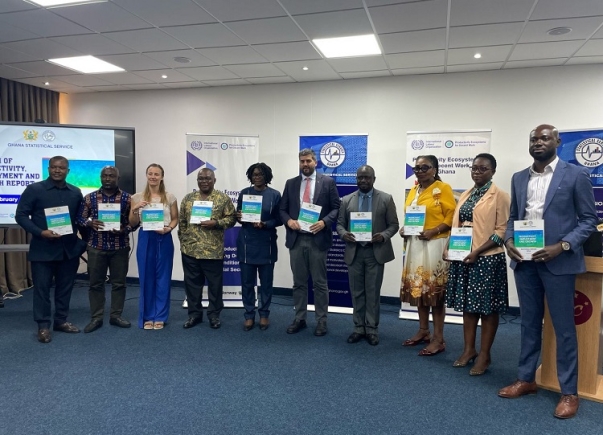Ghana’s economy could double its quarterly Gross Domestic Product (GDP) from GH₵48.2 billion to GH₵96.4 billion, but only if labour and capital are used more efficiently, experts have said.
Speaking at the Productivity, Employment and Growth Report launch in Accra on February 24, 2025, Government Statistician Prof. Samuel Kobina Annim stressed that while productivity has improved over the past three decades, economic growth has not been matched by structural transformation or job creation.
“If Ghana wants to achieve this level of growth, we must rethink how labour and capital are combined across all sectors,” he said. “Mining, for example, contributes significantly to GDP but does not create enough jobs, while manufacturing and commercial agriculture, which have the potential to drive industrialisation, are expanding too slowly.”
The report, released by the Ghana Statistical Service (GSS), shows that labour productivity in Ghana has increased by 240 per cent since 1991, yet 80 per cent of the workforce remains in the informal sector, where wages are low and job security is weak.
Experts warn that unless labour is shifted into higher-productivity sectors, economic gains will not translate into better livelihoods for Ghanaians.
Labour economist Prof. William Baah-Boateng of the University of Ghana said Ghana must address low capital investment and weak sectoral shifts if it wants to sustain long-term economic progress.
“Growth alone is not enough,” he said. “We need policies that encourage labour mobility, moving workers from low-paying, low-productivity sectors into industries that generate higher wages and sustainable jobs.”
The report found that while the electricity sector recorded a 58.5 per cent rise in productivity, wages did not increase at the same pace.
Meanwhile, the accommodation and food services sector, which employs a large share of Ghana’s workforce, had the lowest productivity growth at just 0.4 per cent.
Experts at the launch called for stronger investment in infrastructure, technology, and industrial expansion to bridge the gap between economic growth and job creation.
With the government’s 24-hour economy policy under discussion, Prof. Baah-Boateng said Ghana must invest in security, energy, and workforce skills to make it viable.
The Productivity, Employment and Growth Report is the first of its kind published by GSS. It is expected to serve as a reference for policymakers, businesses, and labour unions in shaping Ghana’s economic future.

